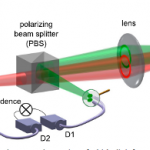Science
At last! Here is the much delayed Carnival of Evolution 48!
I must begin by apologizing for my tardiness, especially since John Wilkins managed to post the last one on time. I was traveling in the 2½ weeks preceding the deadline for CoE, and the combination of spotty internet access, extreme jetlag (British Columbia to Germany to Iceland, where the sun hovered around the horizon all night long, just messed me up), and of course, the incredible distractions of exotic foreign lands, meant that I was disgracefully dilatory in putting it all together.
To reward your patience (or punish you…
there is a curious result in behavioural economics, which shows that paying people to do what they like to do, sometimes provides a disincentive for them to do it, and people correspondingly lower their effort to do the task.
The example I recently came across, from the 7 Rules of Behavioural Economics, or some such, was that if you pay people to have their friends for dinner, they entertain less.
But, enough about the decline of intradepartmental socialization...
The reason I thought of this, is that yesterday we congratulated a colleague on a nice result, and another colleague asked some…
In which NASA gets presented with two Hubble class wide field space telescopes...
Oh my. So some of the mysterious maneuverings at NASA's Astrophysics division can now be better understood.
The National Reconnaissance Office was sitting on a couple of spare space telescopes they are willing to transfer to NASA.
These are presumably late block Keyhole reconnaissance satellite spares, maybe even the two extras orders a few years ago at the end of the program.
So, state of the art as of 10-20 years ago.
We are looking at two partial telescopes, with a Hubble size primary mirror, 2.4m, but…
In which we do a little ResearchBlogging, taking a look at a slightly confusing paper putting a new twist on the double-slit experiment.
------------
I'm off to California this afternoon, spending the rest of the week at DAMOP in Pasadena (not presenting this year, just hanging out to see the coolest new stuff in Atomic, Molecular, and Optical Physics). I don't want to leave the blog with just a cute-kid video for the whole week, though, so here's some had-core physics: a new paper in the Proceedings of the National Academy of Sciences (freely available online), looking at a new sort of…
In which we look at the very latest in amphibian science.
------------
The embedded video shows one Prof. S. Kid describing her latest observations in detail. It's a very comprehensive study.
I've pointed out before that pover the last couple of years I've become a bit of a fan of old time radio, having discovered Radio Classics on Sirius XM Radio. I don’t remember how I discovered it, but I rapidly became hooked on shows like Suspense, Yours Truly, Johnny Dollar, The Whistler, Gunsmoke, Dragnet, The Six Shooter, and The Adventures of Sam Spade (the Howard Duff episodes, of course). Then, of course, there's The Story of Dr. Kildare. This particular radio show stared Lew Ayres as Dr. Kildare and Lionel Barrymore as the irascible Dr. Leonard Gillespie (the latter of whom was…
In which I talk about the common complaint that we teach students physics that "isn't true," and the limits on that statement.
------------
Frequent commenter Ron sent me an email pointing to this post by David Reed on "What we “know” that t’aint so…. and insist on teaching to kids!":
he science we teach is pretty old. Mostly 19th century ideas about the world around us are taught as “facts” with little but anecdotal data to support it. We teach it via an ontology that replays the history of science, thus the newest and most powerful scientific understandings are viewed as “too advanced”. If…
When I saw the latest screed from that very living embodiment of crank magnetism, Mike Adams, I chuckled. I sent it around to some fellow skeptics, including, for instance, the crew at The Skeptics' Guide to the Universe, as well as acquaintances and friends of mine because I couldn't believe it. Adams, as loony as he is, had topped himself. In the meantime, I couldn't decide whether or not to write about it, particularly after Steve Novella took a swipe at it. After all, there are things that are so loony, so out there, that one seriously has to worry about whether they are the result of…
In which I talk about why it is that particle physics and cosmology are so over-represented in popular physics, and why my own books contribute to that.
[The too-short excerpts on the new front page are beyond my ability to change, so I'll be doing Victorian-style "In which..." summaries at the start of posts as a work-around, so a casual visitor has some idea what a psot is about before clicking through.]
One of the maddening things about the recent upgrade of the ScienceBlogs back end has been that a lot of things have been posted during that time that I wanted to respond to. Near the top…
"This seems to be the law of progress in everything we do; it moves along a spiral rather than a perpendicular; we seem to be actually going out of the way, and yet it turns out that we were really moving upward all the time." -Frances Willard
As spring gives way to summer here in the Northern Hemisphere, one of the most beloved sights of the night sky becomes ever more prominent: the Big Dipper.
(Image credit: NASA, ESA, Z. Levay (STScI) and A. Fujii.)
These seven bright stars shine high above the horizon after sunset, and will continue to do so over the rest of the Spring and all Summer…
The blog is recovering from the transition to WordPress, but I'm still not fully confident in it. So We'll turn to another corner of the social media universe for my procrastinatory needs this morning: Having Emmy answer physics questions on Twitter.
The same deal as when we've done this before: If you've got a physics question you'd like my dog to answer, post it to Twitter with the hashtag #dogphysics (or leave it in a comment, or email it to me), and Emmy will answer via Twitter, where she's @queen_emmy.
I was going to post something noting that the great WordPress transition will begin at 7pm tonight, and comments after that time will be lost like Roy Batty's tears. However, I have much happier news: tomorrow's Science Times (available on the Web already) will include a review of How to Teach Relativity to Your Dog!
I considered reading this book aloud to my dog, even though I doubted he would understand relativity, even as explained by the witty and clear-thinking Chad Orzel. Maxwell does seem to show some interest in Newton's first law: A body at rest tends to remain at rest, and a body in…
So, you find yourself living in the San Francisco Bay area, and you maybe have a dog who would like to know something about relativity, or you maybe want to someday have a dog who will want to know something about relativity, or you maybe want to know something more about relativity yourself, in case you ever find yourself cornered in a dark alley by a Rhodesian ridgeback who snarls "Explain time dilation to me, or I'll eat your face!" Well, in that case, you definitely want to be at Kepler's Books in Menlo Park on the evening of June 14th, when I'll be doing a book promotion thing for How to…
This has been out for a little while now, and Chris has been promoting it very heavily, and it's sort of interesting to see the reactions. It's really something of a Rorschach blot of a book, with a lot of what's been written about it telling you more about what the writer wants to be in the book than what's actually in it. A lot of conservative responses to it are basically case studies in the sort of motivated reasoning Chris is writing about, but I've even seen some liberals jumping on it as completely confirming their own pre-existing biases, for example, claiming that this means Chris…
There's been a bunch of discussion recently about philosophy of science and whether it adds anything to science. Most of this was prompted by Lawrence Krauss's decision to become the Nth case study for "Why authors should never respond directly to bad reviews," with some snide comments in an interview in response to a negative review of his latest book. Sean Carroll does an admirable job of being the voice of reason, and summarizes most of the important contributions to that point. Some of the more recent entries to cross my RSS reader include two each from 13.7 blog and APS's Physics Buzz.
I…
prescience
Neutrinos to Give High-Frequency Traders the Millisecond Edge
Bruce Dorminey writes about the real edge the big boys have...
30 millisec trading advantage on the NY/Tokyo spread is nothing to sneeze about, just get some pulsed collimated neutrino burst generators, swap your low bit unbreakable one time pads and go wild on the arbitrage as you trade your Ningi for Cold Pressed Latinum Bars!
but we knew this...
"...The most interesting applications of this would of course be for signaling; however there private enterprise is way ahead of us, and clearly some very clever hedge fund…
One final thought on the Big Science/ Space Chronicles stuff from last week. One of the things I found really frustrating about the book, and the whole argument that we ought to be sinking lots of money into manned space missions is that the terms of the argument are so nebulous. This is most obvious when Tyson or other space advocates talk about the need for "inspiring" people, but it shows up even in what ought to be relatively concrete discussions of actual science.
Take, for example, the argument over humans vs. robots. Given the success of the robotic missions to Mars and other bodies,…
I go back and forth about the whole question of scientific accuracy in tv shows and movies. On the one hand, I think that complaining "Explosions don't make noise in space!" is one of the worst forms of humorless dorkitude, and I'm generally happy to let bad science slide by in the service of an enjoyable story. On the other hand, though, I am a professional physicist, and it's hard to turn that off completely.
Weirdly, one thing that tends to push me toward complaining about the science is when people start doing "The Science of ______" pieces, as both MSNBC and io9 did for The Avengers, and…
It's no secret that over the years I've been very critical of a law passed nearly 20 years ago, commonly referred to as the DSHEA of 1994. The abbreviation DSHEA stands for about as Orwellian a name for a law as I can imagine: the Dietary Supplement Health and Education Act. Of course, as we've pointed out time and time again, the DSHEA is not about health, and it's certainly not about education. Indeed, perhaps my favorite description of this law comes from blog bud and all around awesome internist Dr. Peter Lipson, who refers to it as a "travesty of a mockery of a sham." Rather, it's about…



